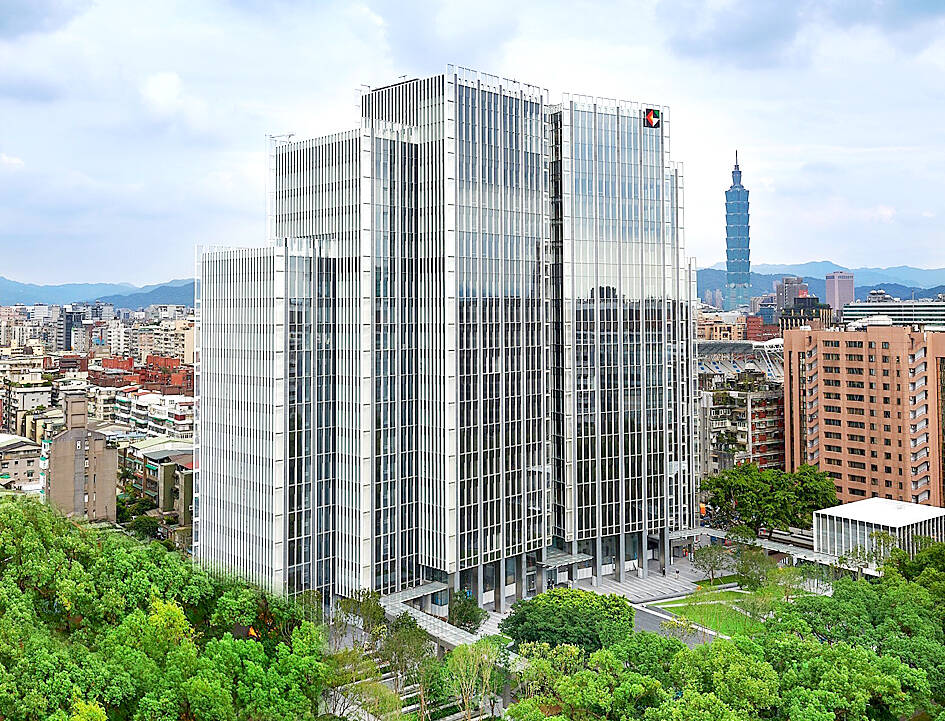KGI Financial Holding Co (凱基金控) yesterday said its life insurance arm has increased hedging and adopted other moves to curb the impact of the local currency’s appreciation on its profitability.
“It is difficult to accurately depict the hedging costs, which might vary from 7 percent to 40 percent in a single day,” KGI Life Insurance Co (凱基人壽) told an investors’ conference in Taipei.
KGI Life, which underpinned 66 percent of the group’s total net income last year, has elevated hedging to 55 to 60 percent, while using a basket of currencies to manage currency volatility, the insurer said.

Photo courtesy of KGI Financial Holding Co
As different currencies demonstrate varying degrees of valuation changes, it is hard to tell the exact cost of hedging, it said.
The insurer said that based on its foreign exchange exposure, every NT$0.1 rise in the New Taiwan dollar against the US dollar would negatively impact the company by about NT$1.7 billion (US$56.79 million), without accounting for valuation gains from hedging instruments.
When gains from traditional hedging instruments and diversified currency positions are considered, the actual impact is expected to be less than NT$1.7 billion, it said, adding that non-deliverable forwards are a part of its toolkit.
As of the end of last month, KGI Life held NT$21.2 billion in foreign exchange reserves, with a break-even point on the exchange rate estimated between NT$30.7 and NT$30.8 against the US dollar, the company said.
The local currency yesterday gained NT$0.08 to close at NT$29.935 in Taipei trading, the highest in more than two years, amid concern over US and EU trade.
The continued advance in the NT dollar could spell foreign exchange losses for local life insurers given their heavy holdings of US Treasuries, corporate debts, securities and other US dollar-denominated investment instruments.
Unrealized losses on equity holdings are expected to decline as gains are realized over time, company officials said, pointing out that the company recorded a small valuation loss on real estate due to a first-quarter reappraisal.
KGI Life updated its embedded value, which stood at NT$475.9 billion late last year, rising 11.3 percent from the previous year.
Embedded value is a measure used by the industry to reflect a life insurer’s total value, including the current value of existing business and forecast profits from policies in force.
The embedded value is NT$28.4 per share, company data showed.
KGI Bank (凱基銀行), the group’s banking arm, said it is looking at loan growth of 15 percent this year, with similar contributions from mortgage and corporate lending operations.
Despite uncertainty linked to US trade policy, the bank said it is aiming for overall loan growth of at least 10 percent, with increases in loan size, interest margins and fee income.

CHIP RACE: Three years of overbroad export controls drove foreign competitors to pursue their own AI chips, and ‘cost US taxpayers billions of dollars,’ Nvidia said China has figured out the US strategy for allowing it to buy Nvidia Corp’s H200s and is rejecting the artificial intelligence (AI) chip in favor of domestically developed semiconductors, White House AI adviser David Sacks said, citing news reports. US President Donald Trump on Monday said that he would allow shipments of Nvidia’s H200 chips to China, part of an administration effort backed by Sacks to challenge Chinese tech champions such as Huawei Technologies Co (華為) by bringing US competition to their home market. On Friday, Sacks signaled that he was uncertain about whether that approach would work. “They’re rejecting our chips,” Sacks

Taiwan’s exports soared 56 percent year-on-year to an all-time high of US$64.05 billion last month, propelled by surging global demand for artificial intelligence (AI), high-performance computing and cloud service infrastructure, the Ministry of Finance said yesterday. Department of Statistics Director-General Beatrice Tsai (蔡美娜) called the figure an unexpected upside surprise, citing a wave of technology orders from overseas customers alongside the usual year-end shopping season for technology products. Growth is likely to remain strong this month, she said, projecting a 40 percent to 45 percent expansion on an annual basis. The outperformance could prompt the Directorate-General of Budget, Accounting and

NATIONAL SECURITY: Intel’s testing of ACM tools despite US government control ‘highlights egregious gaps in US technology protection policies,’ a former official said Chipmaker Intel Corp has tested chipmaking tools this year from a toolmaker with deep roots in China and two overseas units that were targeted by US sanctions, according to two sources with direct knowledge of the matter. Intel, which fended off calls for its CEO’s resignation from US President Donald Trump in August over his alleged ties to China, got the tools from ACM Research Inc, a Fremont, California-based producer of chipmaking equipment. Two of ACM’s units, based in Shanghai and South Korea, were among a number of firms barred last year from receiving US technology over claims they have

BARRIERS: Gudeng’s chairman said it was unlikely that the US could replicate Taiwan’s science parks in Arizona, given its strict immigration policies and cultural differences Gudeng Precision Industrial Co (家登), which supplies wafer pods to the world’s major semiconductor firms, yesterday said it is in no rush to set up production in the US due to high costs. The company supplies its customers through a warehouse in Arizona jointly operated by TSS Holdings Ltd (德鑫控股), a joint holding of Gudeng and 17 Taiwanese firms in the semiconductor supply chain, including specialty plastic compounds producer Nytex Composites Co (耐特) and automated material handling system supplier Symtek Automation Asia Co (迅得). While the company has long been exploring the feasibility of setting up production in the US to address